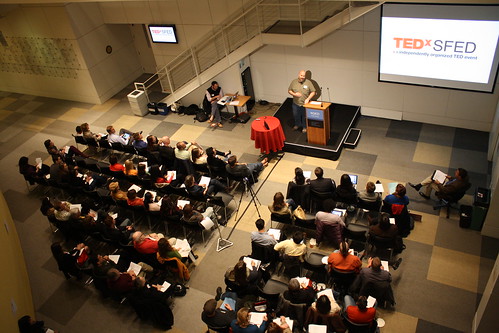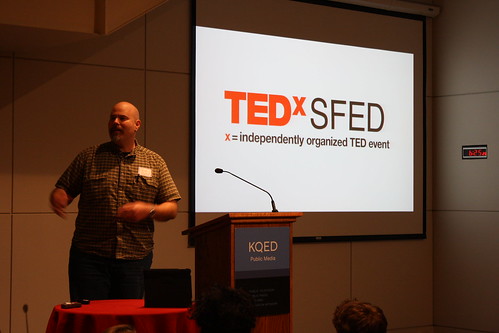
I had a great time last night, speaking at the TEDxSFED Speaker's Search at KQED Public Radio. There were 14 of us, ranging from a parent to a corporate CEO.
We'll find out soon who made the top spot and an invite to speak at TEDxSFED on April 9th.

Here is a copy of my 3-minute talk...
“What if a Jewish person turned into a vampire?” Kirin asked me one day. “Would that vampire be afraid of a Star of David like regular vampires are afraid of a cross?” “That’s the great thing about vampires,” I replied. “Because they are a literary devise, they can do pretty much whatever the author wants them to.”
We talked for about fifteen minutes about Kirin’s Jewish vampire, specifically, weather or not he will cringe at a Star of David, and what that decision might mean. Would it mean that Kirin has replaced the exclusive rightness of Christianity with an exclusive rightness for Judaism? Or will it be more multi-cultural, where the vampire is really cringing at our symbols of goodness and righteousness? Or will all vampires cringe at all holy symbols marking out the many paths up the mountain of faith?
In a deferent year, a puzzled-faced fourteen-year-old girl stuck up a conversation with me one afternoon.
“I was reading here in Hammurabi’s code.” She began. “I get how it says that if the farmer doesn’t keep the levees on his land in good repair, and when the river floods, the levee breaks and ruins his neighbor’s land that he’s responsible to repair the damage and pay the neighbor for the neighbor’s ruined crops. I get that,”
“But what if the farmer was renting the land?”
Both of these children were in classes of mine at Skyline High School, across the bay in Oakland. What makes these children remarkable is not their uniqueness; I could talk all night, telling you similar stories. What makes them remarkable is that these stories of curiosity and wonder come from a so-called “failing school.”
You see, the problem for these children, and my school is that neither Babylonian rental law and nor Jewish vampires are on the high-stakes test in Spring.
The center piece of No Child left Behind is that all schools will have all students testing at “proficient” or above in reading and math by 2014.
100% of schools
100% of students “Proficient” or above in reading and in math.
A goal like that leaves little room for wonder. It leaves little room for creativity; for divergent thinking.
A goal like this reduces schools and teaching to an integrate game of trivial pursuit with only two categories of value.
So, contrary to the wisdom enshrined in the name of the legislation, children like these are told that what they are good at doesn’t count and what they are curious about doesn’t matter.
I had hope that things would be different after the 2008 elections, but as a new set of testing gurus begin work on a new set of tests, my hope fades.
I hope we can all take a deep breath and remember that education is a lot more complex than the score on a single test.
I hope we can come to our senses and demand that our government does away with these tests. As the farmer says, “You can’t fatten the hog by weighing it.”
We need fewer tests in our schools. We need more room for curiosity, more room for wonder. We need more room for Jewish vampires.
7 comments:
Deleted post from from an ad-bot talking about bed sheets.
Thank you Dave. You speak for creative teachers and creative kids everywhere. No Child Left Behind, also means No Child Gets in Front. We are destroying much of what is valuable in our students with this constant testing, and harping on a few specific tests as being somehow an indicator of all knowledge. Good luck to you in your teaching. The students deserve more creative thinking and less testing.
Congrats, David. Melia mentioned you were doing this and I'm so glad you got selected! You speak for me too, in a 'successful' school where test scores are all and creativity, imagination, curiosity and being a kid take a back seat.
I came across your blog from a recent InterACT post. This cuts to the chase on what mindset we want our students to go out into the world with: rote learning or creativity that knows no bounds. It puts NCLB up to the light and makes clear why it is such a soul-sucking travesty to education, all in three minutes or less. Good luck at TEDxSFED, Dave.
Paul Hawking
Blog:
The Challenge of Teaching Math
Latest post:
Putting your students to work (part 1)
http://challenge-of-teaching-math.blogspot.com/2011/03/putting-your-students-to-work-part-1.html
A week or two ago my CT's English class was disrupted for three days with "benchmark testing" designed to show how much the kids had learned in 3 months. We had to cancel the unit on (I think it was) elements of literature. I really don't get the point of testing kids on material we have to drop because we're testing the kids on the days the materials should be taught. Add to that furlough days and shorter school days ...
I worry that when these kids are adults and are doing my taxes, giving me health care, working on my car, or voting for me in Congress they won't have the education they need to do a very good job of it. Teachers can be phenomenal, but if they don't have enough time, how can their students really profit from their expertise?
r3f58r4w89 z4n64z7x67 y5u23d8t36 y9u99r5m29 g1v35e7r01 z0e55m6o22
Post a Comment